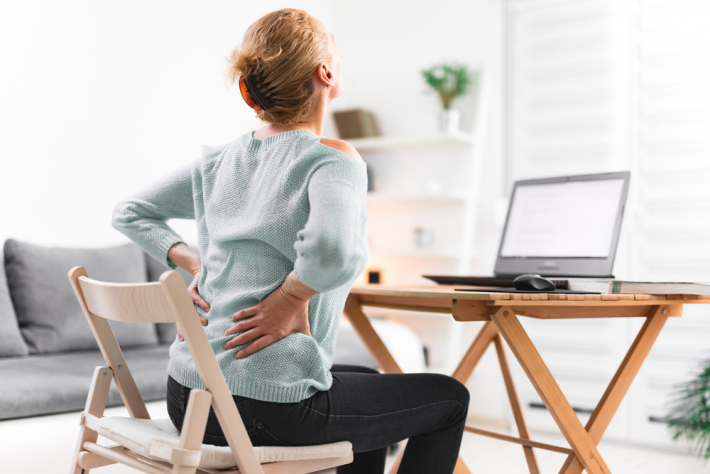
Working from the comfort of your own home might sound like a dream come true, but your back and neck will not be on the same page with you on this one. As more workplaces are adopting flexible work arrangements, a problem not many of us are aware of is the risk of injury that comes with working from an ergonomically-challenged home office (or worse, from the sofa!).
The effects of using a poorly designed or improvised office space might not be obvious at first, but can damage your spine long term, which is quite literally a real pain in the neck.
Read on to find out how to protect your back and neck when working from a home office!
How working from home affects your back
Bad posture can damage the spinal structures and give you aches and pains that are hard to tolerate, especially in the back and neck area. If you work in an office, we’re sure you’re already familiar with the effects of prolonged sitting and slouching.
Working from home can amplify these back problems, as most home offices simply don’t have the space to accommodate high-end ergonomic furniture (you’re starting to miss your fancy office chair, right?). For most people, working from home means using the computer on a kitchen table or worse, sitting on the couch with the laptop on their lap.
A few months of doing this and you’d be on the road to serious musculoskeletal complaints like back & neck pain, shoulder stiffness, carpal tunnel syndrome, and wrist and forearm pain.
The good news is that there are a few simple adjustments you can make to prevent these problems, especially when combined with sensible work breaks and regular stretching exercises.
Adjust your computer screen
It’s very important to position the computer screen at a proper height, so that you don’t have to look down at it. Ideally, your neck should be straight when working (your ears should be aligned with your shoulders).
Another common mistake is positioning the monitor off to the side, which only leads to neck pain and swiveling. Make sure it’s straight in front of you – if you’re using a laptop, you might need to put it on a pile of books or a cardboard box to raise it to a comfortable position.
Sit back in your chair
Most people tend to slouch forward on their chairs or strain their backs trying to sit upright, causing the spine to become stiff and sore. In its most relaxed position, the lower back curves slightly forward towards the belly. When you lean forward, the lumbar spine bends out, putting pressure on your back. To prevent this issue, try to sit back on your chair so that some of your weight is supported by the chair backrest. If your chair is not designed to offer good lower back support, use a cushion behind your lower back. Even better, invest in a lumbar support pillow.
Rest your feet on the floor
If your feet don’t reach the floor, use a box or a footrest. Letting your legs dangle in the air or putting them underneath the chair only puts more strain on your back.
It’s also important to not cross your legs or sit on one leg – although these positions are comfortable, they affect not only your back, but your circulation as well, increasing the risk of deep vein thrombosis.
Avoid working from bed
Are you in the habit of jumping back in bed as soon as Zoom meetings are over? We get why this is considered one of the perks of working from home (along with wearing our favourite track pants every day), but it’s even worse for your back than that uncomfortable kitchen chair, since you will have to hunch over to work on your laptop.
Although we recommend switching to a table and chair, if a bed is your only option, put a pillow behind your back and against the headboard in order to keep your back straight. Use a laptop low table or a pillow to prop up the screen so that you don’t have to look down at the monitor.
If your back is causing you discomfort, don’t let the problem get worse before you get help! With the proper treatment and a bit of discipline when it comes to correct posture, you can live a pain-free life! Contact our trusted physiotherapy team in Dianella for an appointment today.
